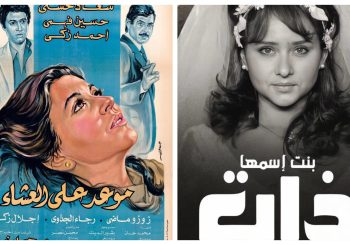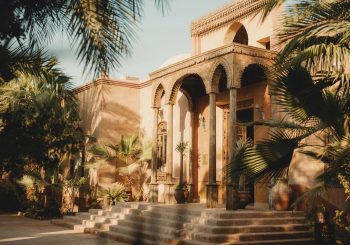On this very day, 124 years ago, Abdelsalam Al-Nabulsi was born in a village near Tripoli in northern Lebanon. Little did he know that he would later become one of Egypt’s most celebrated comedians at the height of the Arab world’s golden age of cinema. However, in his early days, Al-Nabulsi never imagined this life for himself. In fact, he believed his future was settled even before he could make his own choices.
Al-Nabulsi’s devout Muslim family had a clear plan for him: to follow in his father’s footsteps and become a judge in the Sharia courts. Despite his interest in arts and humanities, it was not a surprise when he was sent to Cairo at the age of 20 to study at the renowned Al-Azhar University. Unbeknownst to the young man, destiny had something else in store.
In Egypt, in the embrace of Al-Azhar’s study circles, he memorized the Quran aided by his brilliance in the Arabic language. Al-Nabulsi was on his way to becoming the man his family wanted him to be. It was not until the events of the 1919 Revolution and the cultural renaissance that followed that Al-Nabulsi abandoned the courtyards of Al-Azhar to the studios and theaters of Emad Al-Din Street in Downtown Cairo, which was the heart of the Egyptian art scene at the time.
His family sought to dissuade him from this life by cutting off their financial support, but Al-Nabulsi remained resolute in his pursuit, determined to carve his path even if it meant going it alone.
In his earlier years, Al-Nabulsi honed his acting skills by working in theater, experimenting with different colors of the art form. In 1929, his efforts were rewarded when he scored his first role in the silent picture Ghadet Al-Sahara (The Belle of the Desert). To him, this modest role was nonetheless the culmination of years of hard work.
Two years later, Al-Nabulsi’s stardom would grow boundless after his role in Wakhz Al-Damer (A Guilty Conscience), in which he starred alongside Asia Dagher, Moneir Fahmy, and Mary Queeny.
In 1939, after a dozen more films, a pivotal moment arrived for Al-Nabulsi, when he secured a role in Kamal Selim’s Al-Azema (The Will). This particular film would come to define his acting style. Al-Nabulsi portrayed a dissolute aristocrat, urging his friend Adly (Anwar Wagdy) to embrace a more indulgent and sensual way of life. This aristocratic, hedonistic character would earn him the moniker ‘Count Al-Nabulsi’, and he would continue to play similar roles throughout the 1940s.
His acting style, one which relied on improvising and playing with words, exploring the uncharted bounds of language in this nascent art form, made him lean more towards comedic roles after the end of the Second World War.
During Egypt’s golden age of cinema in the 1950s, a period that left an indelible mark on the entire region, Al-Nabulsi emerged as a standout comedian. He shared the screen with renowned figures like Farid Al-Atrash, Abdelhalim Hafiz, and Mohammed Fawzy, all legends of the musical genre.
Al-Nabulsi’s partnership with his close friend Al-Atrash led to thirteen on-screen collaborations. He also appeared in seven movies alongside Fawzy. However, the apex of his career is often associated with the five films he acted in alongside Hafiz.

These films are, namely, “Layali Al-Hob” (Love Nights) (1955), “Fata Ahlamy” (My Prince Charming) (1957), “Hekayyet Hob” (The Story of a Love) (1959), “Shari Al-Hob” (The Street of Love) (1958), and “Youm Omri” (A Day in My Life) (1961). Collectively, these movies solidified Al-Nabulsi’s lasting legacy in Egyptian cinema and popular culture influence on popular culture that still lives on to this day.
In his significant filmography of 146 films, Al-Nabulsi only played the leading role in six films, two of which were his own productions .
In his sixties, Al-Nabulsi, formerly Cairo’s most eligible bachelor, found love and married one of his devoted fans, Georgette Sabat, with whom he relocated to Beirut.

A series of unfortunate financial setbacks led to Al-Nabulsi’s destitution in his later years. In July of 1968, he passed away from a heart attack. His fortunes diminished entirely. It was his enduring friend Al-Atrash who bore the responsibility of his funeral expenses.
On his birthday, fans of this era of cinema remember Abdelsalam Al-Nabulsi’s immeasurable contribution to art and popular culture. His influence on Egyptian cinema and his role in shaping comedic performance reverberate through generations, a testament to the enduring legacy of a man who dared to pursue his dreams and carve a unique niche in the entertainment world.
Subscribe to the Egyptian Streets’ weekly newsletter! Catch up on the latest news, arts & culture headlines, exclusive features and more stories that matter, delivered straight to your inbox by clicking here.






Comment (1)
[…] Source link […]